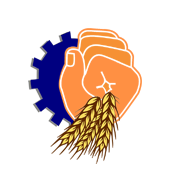 Official logo of the Bharatiya Mazdoor Sangh | |
| Abbreviation | BMS |
|---|---|
| Founded | 23 July 1955 |
| Founder | Dattopant Thengadi |
| Type | Trade Union |
| Legal status | Active |
| Headquarters | Sir Sobha Singh Buildings, Garstin Bastion Road, New Delhi, India |
| Location | |
| Members | 6,215,797 (2002) |
National President (Present) | Hiranmany Pandya |
National General Secretary (Present) | Ravindra Himte |
Key people | Surendra Kumar Pandey, C. K. Sajinarayan, Virjesh Upadhyay Malla Jagadish Rao, B Surendran, Durairaj, Hari Prasad G |
Parent organization | Rashtriya Swayamsevak Sangh (RSS) |
| Website | www |
| Part of a series on the |
| Bharatiya Janata Party |
|---|
 |

The Bharatiya Mazdoor Sangh (translation: Indian Workers' Union) is a trade union in India. [1] It was founded by Dattopant Thengadi on 23 July 1955. [2] The BMS is not affiliated to any International Trade Union Confederation. It is the labour wing of the Rashtriya Swayamsevak Sangh, a right-wing Hindutva paramilitary organisation, and forms a part of the Sangh Parivar, a collective of Hindutva organisations. [3]
The BMS itself claims to have more than 10 million members. According to provisional statistics from the Ministry of Labour, the BMS had a membership of 6,215,797 in 2002. [4] The BMS protested against the neoliberal policies of the Narasimha Rao Government, the Deve Gowda Government, and the Gujral Government. During the tenure of the NDA Government also which had “friends” of BMS in it, BMS had to oppose the anti-labour policies. In the Modi Government, it called for a nationwide movement on 10 June 2020 to protest privatisation in public-sector undertakings (PSUs). [5]